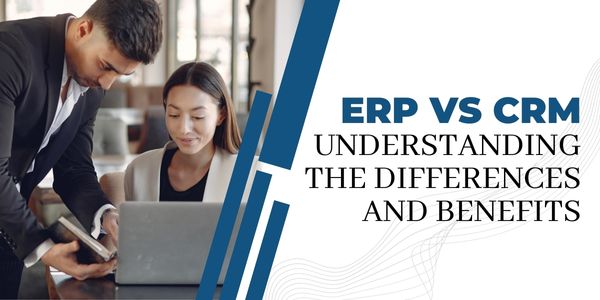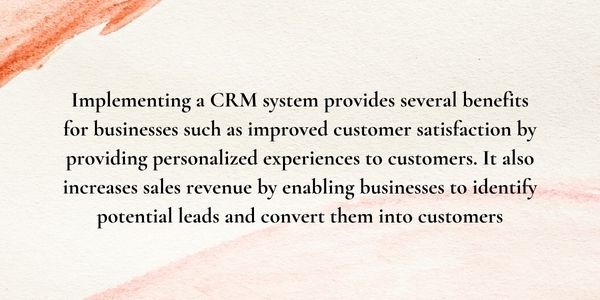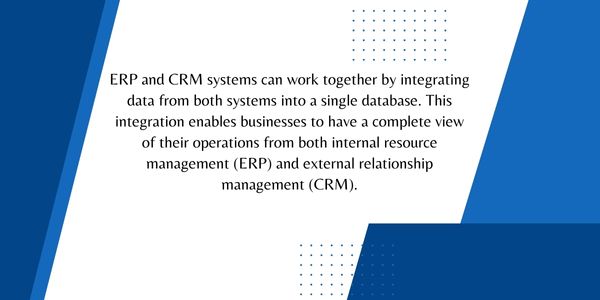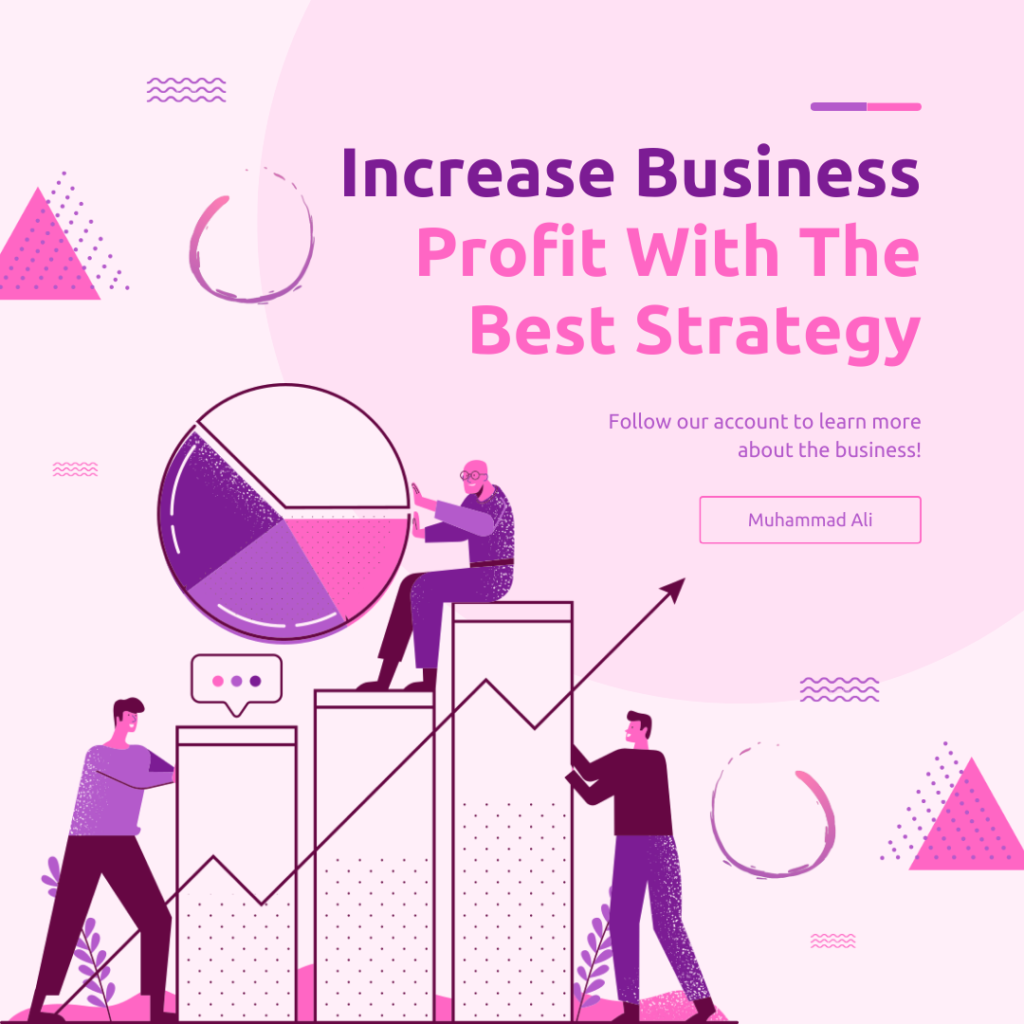Enterprise Resource Planning (ERP) and Customer Relationship Management (CRM) are two essential software systems that businesses use to manage their operations. ERP is a system that helps businesses manage their resources, including finances, inventory, and production. On the other hand, CRM is a system that helps businesses manage their interactions with customers, including sales, marketing, and customer service. Understanding the differences between these two systems is crucial for businesses to choose the right system that suits their needs and reap the benefits of using them.
This article aims to provide an in-depth comparison of ERP and CRM, helping businesses understand the differences between the two and determine which system is the best fit for their specific needs.
Introduction to ERP and CRM
ERP is a software system that integrates various business processes into a single system to streamline operations and improve efficiency. It provides a centralized database that allows businesses to manage their resources effectively. On the other hand, CRM is a software system that helps businesses manage their interactions with customers by providing tools for sales, marketing, and customer service. It enables businesses to build better relationships with customers by providing personalized experiences.
Key Differences between ERP and CRM
The primary difference between ERP and CRM is their focus. ERP focuses on managing internal resources, while CRM focuses on managing external relationships with customers. ERP manages data related to finance, inventory, production, and human resources, while CRM manages data related to sales, marketing, and customer service. Examples of ERP software include SAP, Oracle, and Microsoft Dynamics, while examples of CRM software include Salesforce, HubSpot, and Zoho.
Understanding the Functionality of ERP
ERP consists of various modules that manage different aspects of business operations. These modules include finance and accounting, inventory management, production planning, human resources management, and supply chain management. ERP systems provide features such as real-time data access, automated workflows, and reporting tools that help businesses make informed decisions. Examples of ERP systems include SAP Business One, Oracle NetSuite, and Microsoft Dynamics 365.
Using an ERP system provides several benefits for businesses. It improves efficiency by automating manual processes and reducing errors. It also provides real-time data access that enables businesses to make informed decisions quickly. Additionally, it streamlines operations by integrating various business processes into a single system.
Benefits of Implementing an ERP System in Your Business
ERP systems offer numerous advantages that help organizations streamline their business processes, improve efficiency, and achieve operational excellence. Some key benefits of implementing an ERP system include:
Improved efficiency and productivity: ERP systems automate and integrate various business processes, reducing manual work and enhancing overall productivity.
Streamlined data management and integration: With an ERP system, businesses can consolidate data from different departments, ensuring a single source of truth and enabling better decision-making.
Enhanced inventory and supply chain management: ERP systems provide real-time visibility into inventory levels, enabling optimized inventory management and streamlined supply chain operations.
Financial management and reporting capabilities: ERP systems offer robust financial modules, helping businesses manage accounting, budgeting, and financial reporting more effectively.
Understanding the Functionality of CRM
CRM systems provide tools for managing customer interactions across various channels such as email, phone calls, social media, and chatbots. These tools include lead management, sales automation, marketing automation, customer service management, and analytics. CRM systems enable businesses to provide personalized experiences to customers by tracking their interactions with the business.
Examples of CRM systems include Salesforce CRM, HubSpot CRM, and Zoho CRM. Using a CRM system provides several benefits for businesses such as improved customer satisfaction by providing personalized experiences to customers. It also increases sales revenue by enabling businesses to identify potential leads and convert them into customers. Additionally, it provides better marketing strategies by analyzing customer data and identifying trends.
Benefits of Implementing an ERP System
Implementing an ERP system provides several benefits for businesses such as improved efficiency and productivity by automating manual processes and reducing errors. It also provides better decision-making by providing real-time data access that enables businesses to make informed decisions quickly. Additionally, it results in cost savings by streamlining operations and reducing waste.
Benefits of Implementing a CRM System
Implementing a CRM system provides several benefits for businesses such as improved customer satisfaction by providing personalized experiences to customers. It also increases sales revenue by enabling businesses to identify potential leads and convert them into customers. Additionally, it provides better marketing strategies by analyzing customer data and identifying trends.
How ERP and CRM Work Together
ERP and CRM systems can work together by integrating data from both systems into a single database. This integration enables businesses to have a complete view of their operations from both internal resource management (ERP) and external relationship management (CRM). For example, when a customer places an order through the CRM system, the order details can be automatically transferred to the ERP system for processing.
Using both systems together provides several benefits for businesses such as improved efficiency by streamlining operations across different departments. It also provides better decision-making by providing real-time data access from both systems. Additionally, it results in cost savings by reducing waste across different departments.
Choosing the Right System for Your Business
Choosing the right system for your business depends on several factors such as your business needs, budget constraints, scalability requirements, customization options available in the software system you choose among others.
When choosing between ERP or CRM software systems or both you should consider factors such as your business needs in terms of resource management or relationship management with customers respectively; budget constraints; scalability requirements; customization options available in the software system you choose among others.
Differences Between ERP and CRM Systems – How They Serve Different Purposes
While ERP and CRM systems share the goal of optimizing business operations, they serve distinct purposes and focus on different aspects of an organization. Here are the key differences between ERP and CRM systems:
Scope of functionality: ERP systems primarily concentrate on internal operations, including finance, procurement, manufacturing, and HR, while CRM systems focus on managing customer interactions, sales, and marketing.
Primary functions: ERP systems are responsible for resource planning, process management, and operational efficiency, while CRM systems prioritize customer relationship management, lead generation, and revenue growth.
Data integration: ERP systems integrate various business functions and departments, ensuring seamless data flow between different operational areas. On the other hand, CRM systems centralize customer data and provide a unified view of customer interactions across multiple touchpoints.
Selecting the Right System for Your Business Needs – Factors to Consider
When choosing between an ERP system and a CRM system, or potentially implementing both, it is crucial to consider the following factors:
Business goals and requirements: Evaluate your organization’s specific goals and requirements to determine which system aligns better with your overall strategy.
Budget considerations: Consider the budget available for implementing and maintaining the software system, including factors like licensing fees, customization costs, and ongoing support expenses.
Scalability for future growth: Assess the scalability of the system to accommodate your organization’s future growth plans and evolving business needs.
Integration with existing systems: Evaluate how well the ERP or CRM system can integrate with your existing software applications to ensure seamless data exchange and avoid silos.
Conclusion: Making the Decision Between ERP or CRM – What’s Best for Your Business?
In conclusion, understanding the differences between ERP and CRM is crucial for businesses to choose the right system that suits their needs and reap the benefits of using them such as improved efficiency; better decision-making; cost savings; improved customer satisfaction; increased sales revenue among others. Choosing between these two software systems or both depends on several factors such as your business needs; budget constraints; scalability requirements; customization options available in the software system you choose among others.
To ensure the successful implementation of an ERP or CRM system in your business you should plan ahead; communicate effectively with employees about changes; collaborate with stakeholders; provide ongoing support after implementation among others.
Choosing the right system, whether it’s an ERP system, a CRM system, or a combination of both, is a critical decision that can impact the success and growth of your business. By thoroughly understanding the specific needs and goals of your organization, you can make an informed decision.
For businesses that prioritize streamlining internal processes, managing resources, and optimizing operational efficiency, an ERP system is an excellent choice. The advantages of an ERP system, such as improved productivity, streamlined data management, enhanced inventory and supply chain management, and comprehensive financial capabilities, make it a valuable tool for organizations across various industries.
On the other hand, if your primary focus is building strong customer relationships, boosting sales and marketing effectiveness, and providing exceptional customer service, a CRM system should be your top consideration. With its centralized customer information, increased sales and marketing capabilities, improved customer service and support, and powerful analytics and reporting features, a CRM system empowers businesses to deliver personalized experiences and drive revenue growth.
It’s important to note that ERP and CRM systems are not mutually exclusive. In fact, many businesses benefit from integrating both systems to create a unified and efficient operational environment. Integration between ERP and CRM allows seamless data flow between internal processes and customer interactions, resulting in a holistic view of the business and improved decision-making.
When making the final decision, consider collaborating with key stakeholders from different departments to gather their input and understand their specific requirements. Evaluate the available options in the market, considering factors such as vendor reputation, system flexibility, ease of implementation, and ongoing support.
Remember, the right system for your business is the one that aligns closely with your goals, enhances your operational efficiency, and helps you build strong and lasting customer relationships. By carefully assessing your needs and considering the factors outlined in this article, you can confidently select the ERP, CRM, or integrated solution that will drive growth and success for your organization.




Comments are closed, but trackbacks and pingbacks are open.